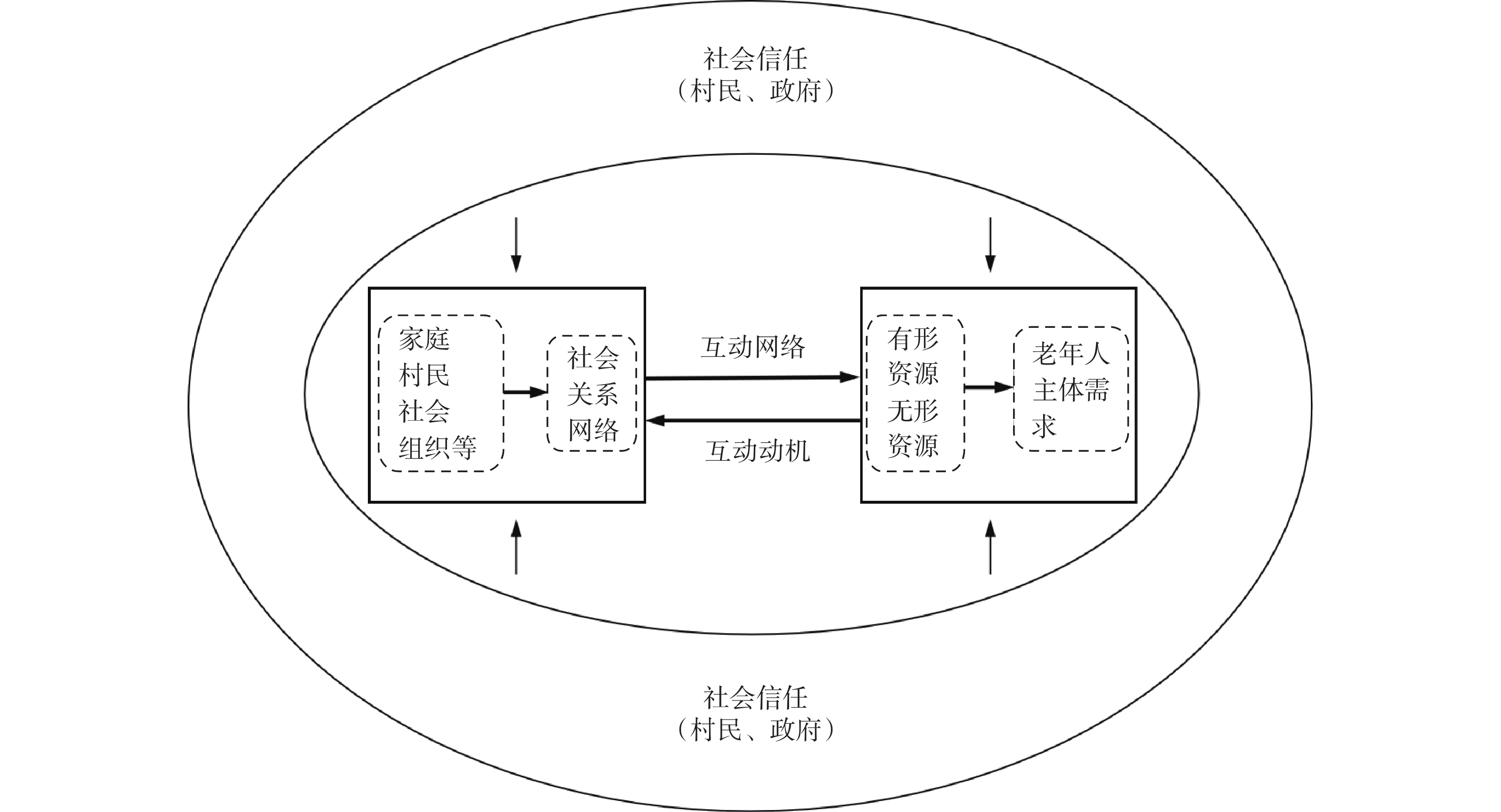The Inherent Behavior Logic and Practical Path for Rural Mutual Support for the Aged
-
摘要: 农村互助养老是具有中国乡土特色的农村养老模式之一。在传统乡村文化“互帮互助”的理念下,以地缘、亲缘为主的乡村生活为农村互助养老的实践提供了可能。农村互助养老的本质是“自助−互助”,文章通过社会资本理论三个核心维度,对农村互助养老实践的内在行为逻辑、现实困境以及可能的实践优化路径进行探讨,提出未来互助养老模式可以在多元主体参与、农村互助养老的供给体系、传统文化优势及提高老年人信任等方面不断发展完善。为农村互助养老服务的长效发展提供了可行性的理论支撑以及路径优化措施,有助于提高农村老年群体幸福感,促进农村养老事业的长足发展。Abstract: Rural mutual support for the aged is one of the elderly care modes in the Chinese context. With the reciprocal support value from traditional Chinese culture, the rural life, which is based on geographical relationship and consanguinity, provides possibilities of mutual support for the aged. The nature of rural mutual support is the combination of self-support and reciprocal support, which reflects the concept of social capital theory. There are three core dimensions of social capital, including social networks, social resources and social trust. In line with these three dimensions, this study explores the inherent behavior logic, the dilemma and the possible practical path of the rural mutual support for the aged. Meanwhile, this study proposes that mutual support for the aged could be promoted in the future by the engagement of multiple service providers, the improvement of the service providing system and the enhancement of the social trust of the elderly by displaying the strengths of traditional Chinese culture. Overall, the social capital theory provides a conceptualized foundation to explain the nature of rural mutual support for the aged, and further improvement measures, which are conducive to the development the rural aged-care service and the promotion of the elderly well-being in rural areas.
-
Key words:
- rural revitalization /
- social capital /
- rural mutual support /
- optimized path of practice
-

图 1 社会资本理论下农村互助养老行为逻辑简化图
-
[1] 徐拓远,张云华. “十四五”时期积极应对农村人口老龄化的思路与举措[J]. 改革,2021(10):31-40. [2] COLEMAN J S. Social capital in the creation of human capital[J]. American Journal of Sociology, 1988, 94:S95-S120. doi: 10.1086/228943 [3] PUTNAM R D. Tuning in, tuning out: the strange disappearance of social capital in America[J]. PS: Political science & politics, 1995, 28(4):664-683. [4] 徐戈,陆迁,姜雅莉. 社会资本、收入多样化与农户贫困脆弱性[J]. 中国人口·资源与环境,2019,29(2):123-133. [5] 李克强. 政府工作报告—2018年3月5日在第十三届全国人民代表大会第一次会议上[J]. 中华人民共和国国务院公报,2018(12):9-24. [6] 贺雪峰. 互助养老: 中国农村养老的出路[J]. 南京农业大学学报(社会科学版),2020,20(5):1-8. [7] 刘妮娜. 互助与合作: 中国农村互助型社会养老模式研究[J]. 人口研究,2017,41(4):72-81. [8] 李俏,刘亚琪. 农村互助养老的历史演进、实践模式与发展走向[J]. 西北农林科技大学学报(社会科学版),2018,18(5):72-78. [9] WILLIAMS C C & WINDEBANK J. Paid informal work in deprived neighborhoods[J]. Cities, 2000, 17(4):285-291. doi: 10.1016/S0264-2751(00)00024-X [10] 米恩广. 可得-可及-有效: 农村互助养老服务的公益性供给逻辑与优化[J]. 大理大学学报,2020,5(11):29-37. doi: 10.3969/j.issn.2096-2266.2020.11.005 [11] 李俏,孙泽南. 农村互助养老的衍生逻辑、实践类型与未来走向[J]. 中南民族大学学报(人文社会科学版),2021,41(10):98-107. [12] 刘妮娜. 农村互助型社会养老: 中国特色与发展路径[J]. 华南农业大学学报(社会科学版),2019,18(1):121-131. [13] 习近平. 决胜全面建设小康社会夺取新时代中国特色社会主义伟大胜利[N]. 人民日报, 2017-10-27(01). [14] 刘妮娜. 从互助养老到互助共同体: 现代乡村共同体建设的一种可行路径[J]. 云南民族大学学报(哲学社会科学版),2021,38(2):109-117. [15] 刘晓梅,刘冰冰. 社会交换理论下农村互助养老内在行为逻辑与实践路径研究[J]. 农业经济问题,2021(9):80-89. [16] 赵周华,王晓琳. 社会资本与农村老年人返贫阻断: 理论机制与实证检验[J]. 中南林业科技大学学报(社会科学版),2021,15(6):67-76,91. [17] 李亚熊,安连朋. 脱嵌与嵌入: 农村留守老人养老从家庭养老到互助养老的嬗变—以陕西省凤翔县Z村为个案[J]. 理论月刊,2021(9):104-112. [18] 罗晓晖. 乡土公共性建构: 破解农村互助养老发展困境之道[J]. 长白学刊,2021(4):135-141. [19] 纪春艳. 新型城镇化视角下农村互助养老模式的发展困境及优化策略[J]. 农村经济,2018(1):90-96. [20] 朱晓霞,肖群. 提升我国养老地产盈利能力的对策分析[J]. 北京科技大学学报(社会科学版),2021,37(5):569-575. [21] 陈功,王笑寒. 我国“时间银行”互助养老模式运行中的问题及对策研究[J]. 理论学刊,2020(6):132-140. doi: 10.3969/j.issn.1002-3909.2020.06.016 [22] 刘洋,王伯承. 主体优势与能动性联结: 乡村振兴中驻村帮扶干部的行动逻辑[J]. 北京科技大学学报(社会科学版),2022,38(1):111-118. -




 下载:
下载:


